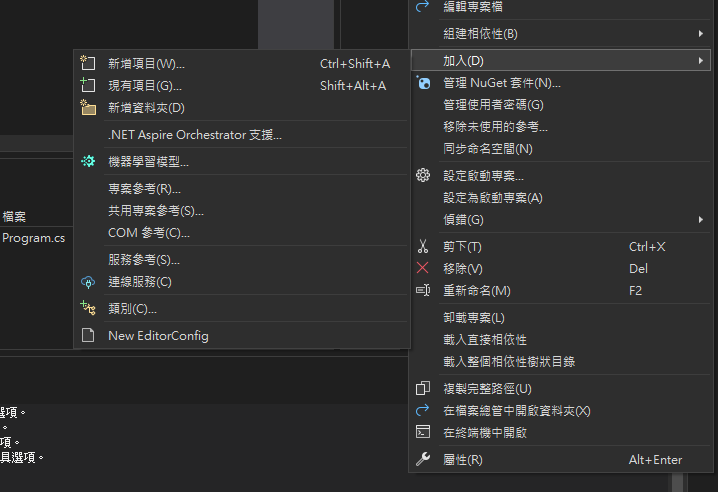C# - 語言結構
認識 C# 架構
Basic Structure
using System;
class Hello
{
static void Main()
{
Console.WriteLine("Hello, World");
}
}
這是最基礎的 C# 程式碼架構,也是微軟 C# 官方教學的第一個範例,這個範例中有幾個重要的元素:
using System;:這是引用命名空間的語法,System是 C# 的核心命名空間,這個命名空間中包含了很多基本的類別,例如Console類別。本來的 code 可以寫成System.Console.Writeline,但是因為引用了System命名空間,所以可以直接寫成Console.Writeline。class Hello:這是一個類別的宣告,類別是 C# 的基本結構,所有的程式都是寫在類別中的。類別用於封裝方法、屬性和其他類別。static void Main():Main方法是 C# 程式的進入點,C# 的執行流程會從這個方法開始執行,所以一個 C# 專案中至少需要有一個 Main 方法作為程式的起始點。
現在用 VS 建 C# 專案,你會發現在最一開始的 Program.cs,也就是 VS 預設幫忙建有 Main 方法的檔案,它頂層不會有有 using system,但當我們自己在這個專案下又建立其它新的 cs file 來撰寫不同邏輯時,VS 卻又自己幫我們引進許多 namespace,這是因為 VS 幫我們初始化專案時會有一行這樣的設定:<ImplicitUsings>enable</ImplicitUsings>。這個設定會讓系統自動在我們的 Program.cs (專案的入口) 隱式做 using... 的動作,但其它 cs 檔案就沒享受到這個福利了。
好像是 .NET 6.0 提供了一種叫最上層陳述式的語法,可以不用寫 class 這個關鍵字,直接寫方法,算是省去了一些程式碼吧,但大家都推薦還是要先學基礎的傳統語法。
順道一提,為 Unity 學 C# 的夥伴,Unity 自己產生的 cs file 是屬於傳統式寫法。
using System;
Console.WriteLine("Hello, World");
Full Structure
但通常一個方案下都會有 N 個專案,每個專案又都有 N 個 cs 檔案各司其職,比如一個遊戲方案下可能有一個專案負責卡牌遊戲的邏輯、一個負責跑酷遊戲的邏輯,這兩個專案下在由複數隻負責不同功能的 cs 檔案組成一個完整的遊戲功能。
有一個重點是,通常一個專案就會視為一個 namespace,也都會有獨立一個含有 Main 方法的 Program.cs。
現在假設有一個方案為 cs_practice,裡面有兩個專案,分別是 test 跟 test2,裡面又有複數個 cs 檔案,下面透過範例介紹怎麼在同一個專案中引用其它 cs 檔案的方法以及怎麼在其他專案中引用另一專案的方法。
--- cs_practice
---- test
---- Program.cs
---- Calculator.cs
---- Greeting.cs
---- test2
---- Program.cs
---- HiFriend.cs
- test 專案
using test2;
namespace test
{
internal class Program
{
static void Main()
{
Calculator calculator = new();
Greeting greeting = new();
HiFriend hiFriend = new();
Console.WriteLine(calculator.Add(1, 2));
greeting.SayHello();
hiFriend.SayHi();
}
}
}
using System;
using System.Collections.Generic;
using System.Linq;
using System.Text;
using System.Threading.Tasks;
namespace test
{
internal class Calculator
{
public int Add(int a, int b)
{
return a + b;
}
}
}
using System;
using System.Collections.Generic;
using System.Linq;
using System.Text;
using System.Threading.Tasks;
namespace test
{
internal class Greeting
{
public void SayHello()
{
Console.WriteLine("Hello, World!");
}
}
}
- test2 專案
namespace test2
{
internal class Program
{
static void Main(string[] args)
{
Console.WriteLine("Hello, World!");
}
}
}
using System;
using System.Collections.Generic;
using System.Linq;
using System.Text;
using System.Threading.Tasks;
namespace test2
{
public class HiFriend
{
public void SayHi()
{
Console.WriteLine("Hi, Friend!");
}
}
}
現在來專注看回 test 專案的 Program.cs:
using test2;
namespace test
{
internal class Program
{
static void Main()
{
Calculator calculator = new();
Greeting greeting = new();
HiFriend hiFriend = new();
Console.WriteLine(calculator.Add(1, 2));
greeting.SayHello();
hiFriend.SayHi();
}
}
}
已知 Calculator 跟 Greeting 都同樣是 test 專案下的其他 cs 檔案中的 class,在 Program.cs 中可以直接使用 Calculator calculator = new(); 來在 Main 方法中實例化 Calculator 這個 class。
而 HiFriend 是 test2 專案下的 class,所以要先引用 using test2;,才能在 Main 方法中實例化 HiFriend 這個 class。
有一個重點是,不是說直接 using test2 就能將 test2 專案的東西引入 test 專案中。首先必須在 VS 中在 test 專案上按右鍵,選擇加入,然後選擇專案參考,這時打開 test.cs.prog 會看到多一行 <ProjectReference Include="..\test2\test2.csproj" />,這樣才能在 test 專案中寫 using test2; ,然後使用 test2 專案的東西。
<Project Sdk="Microsoft.NET.Sdk">
<PropertyGroup>
<OutputType>Exe</OutputType>
<TargetFramework>net8.0</TargetFramework>
<ImplicitUsings>enable</ImplicitUsings>
<Nullable>enable</Nullable>
</PropertyGroup>
<ItemGroup>
<ProjectReference Include="..\test2\test2.csproj" />
</ItemGroup>
</Project>

判別式
if-else
最基本的判別式,如果條件為 true 則執行 if 的 code,否則執行 else 的 code:
int a = 1;
int b = 2;
if (a > b)
{
Console.WriteLine("a > b");
}
else
{
Console.WriteLine("a <= b");
}
switch-case
switch 會根據變數的值來執行對應的 case,如果沒有符合的 case 則會執行 default:
int day = 4;
switch (day)
{
case 1:
Console.WriteLine("Monday");
break;
case 2:
Console.WriteLine("Tuesday");
break;
case 3:
Console.WriteLine("Wednesday");
break;
case 4:
Console.WriteLine("Thursday");
break;
case 5:
Console.WriteLine("Friday");
break;
case 6:
Console.WriteLine("Saturday");
break;
case 7:
Console.WriteLine("Sunday");
break;
default:
Console.WriteLine("Invalid day");
break;
}
迴圈
while
while 會在條件為 true 時一直執行直到條件為 false:
int i = 0;
while (i < 5)
{
Console.WriteLine(i);
i++;
}
do-while
do-while 會先執行一次 code,再檢查條件是否為 true:
int i = 0;
do
{
Console.WriteLine(i);
i++;
} while (i < 5);
for
for (int i = 0; i < 5; i++)
{
Console.WriteLine(i);
}
foreach
foreach 用來遍歷集合的元素:
var numbers = new List<int> { 1, 2, 3, 4, 5 };
foreach (int number in numbers)
{
Console.WriteLine(number);
}
